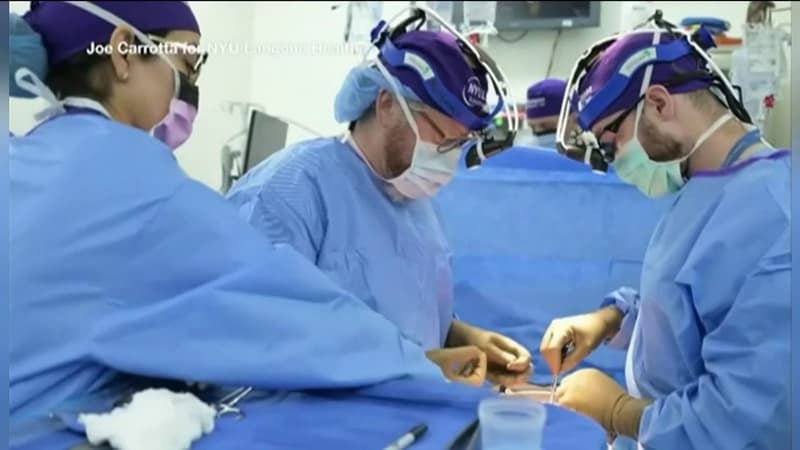Thirty-two days without rejection. For more than a month, a genetically modified pig’s kidney has been working after being transplanted into a brain-dead man who was put on a ventilator. A record and a hope.
“The kidney is working perfectly, it has fulfilled the same role that is expected of a normal human kidney,” announced Dr. Philip Sommer, a physician at Langone Hospital in New York, during a press conference on Wednesday.
an extra month
Implanted on July 14, the organ continues to function. These thirty-two days represent “the longest period during which a genetically modified pig kidney has functioned in a human being,” the hospital welcomed in a press release.
For more than a month, “kidney biopsies and tests show no signs of rejection,” said Dr. Robert Montgomery, director of the Langone Hospital Transplant Institute, the pig kidney replaces all the important functions provided by a kidney human.
According to him, this step should lead to a clinical trial in a living human being. The hospital has also indicated that it plans to continue the experiment for another month, until mid-September.
genetic changes
A team of French researchers made this feat possible. Two experiments had been carried out in 2021 and 2022, one on a living man, but without success.
The samples were sent by American scientists and analyzed in France. “We identified rejection mechanisms and that allowed us to propose to the American team to change the genetic modifications of the pigs and adapt the treatments of the patients to make sure that the transplant is better accepted in this new experiment”, Valentin Goutaudier, a medical researcher, explains to BFMTV. .
In particular, the doctors transplanted the pig’s thymus, a gland that plays an important role in the immune response, to help the recipient’s cells identify the pig’s cells as their own, thus also helping to avoid rejection, he explained during a conference. press release Dr. Adam Griesemer, involved in the operation.
“This is a great victory! It is a spectacular scientific advance and an enormous hope for patients… We would not have imagined, five years ago, that such results and advances could be achieved”, rejoices Alexandre Loupy, director of the unit of INSERM research.
“The shortage of organs could be solved in part,” he adds.
88,000 Americans waiting for a kidney
This experiment aims to respond to the shortage of organ donations in a country where tens of thousands of patients are on the waiting list for transplants: more than 100,000 Americans, of whom about 88,000 are waiting for a kidney.
“I strongly believe that xenografts (transplants where the donor and recipient are not the same species, editor’s note) are a viable way to change that,” said Dr. Robert Montgomery.
His hope is based in particular on the fact that the pigs used “are not cloned, but bred, their numbers can be increased much more easily, to provide an unlimited supply of kidneys for patients in need.”
“A Gift to Humanity”
Maurice Miller, who donated his body for this scientific experiment, died suddenly at the age of 57 from late-detected brain cancer.
“It was a very difficult decision to make,” said the deceased’s sister, Mary Miller-Duffy, who agreed to have her brother’s body used for this study on Wednesday. “Although my brother cannot be there, I can confidently say that he would have been proud that the tragedy of his death helped so many people’s lives.”
“She found a way to help her brother fulfill his wish to give a gift to humanity at the moment of his death, in a moment of deep grief,” concluded Dr. Robert Montgomery.
Source: BFM TV


